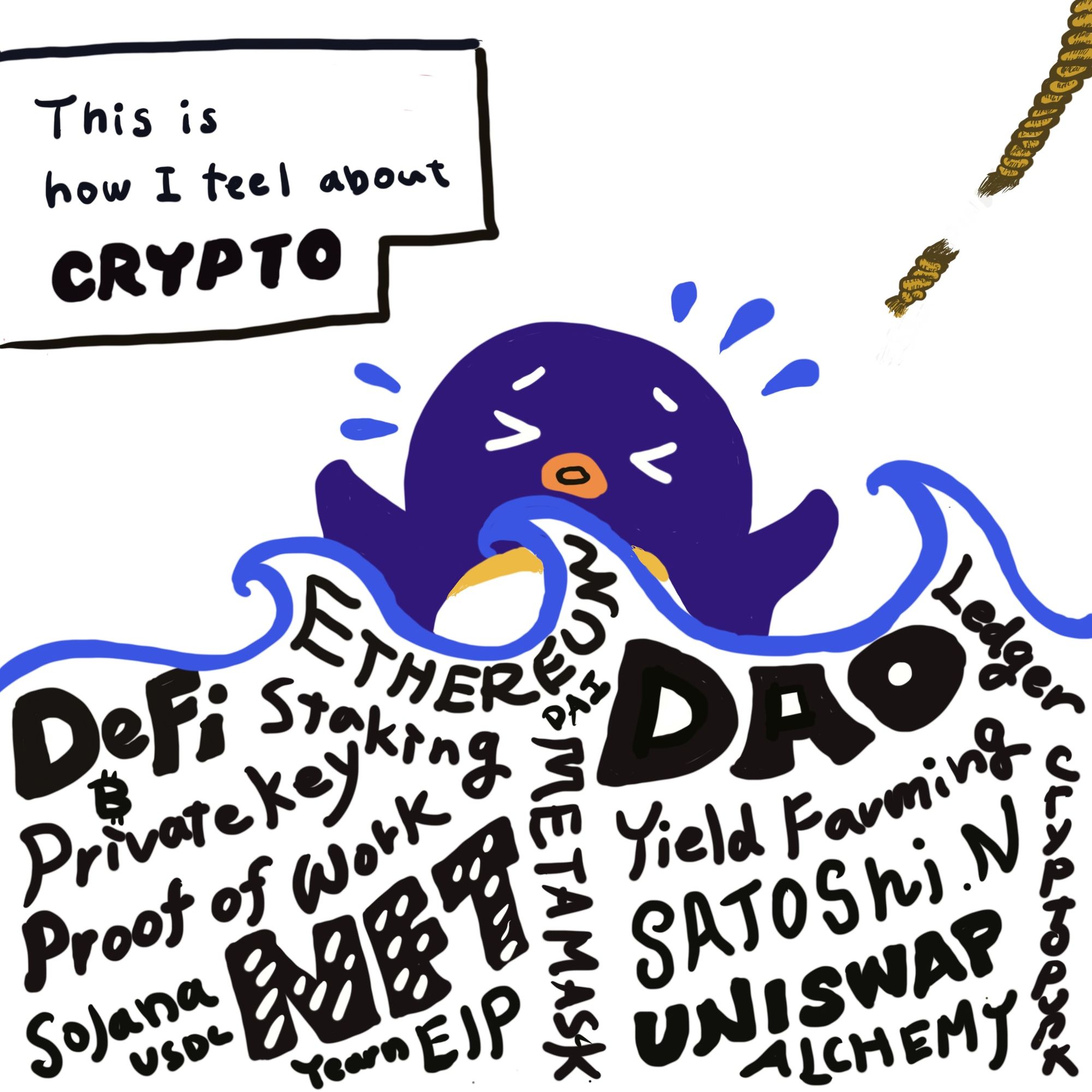
Introduction to NFT Terminology
We know that it can be overwhelming keeping up with all of the words and acronyms you hear your degen friends using. Not sure what a degen is? Don’t worry, you will soon enough, with our handy NFT Terminology reference! Despite the title, we’ll actually be covering more than just NFTs: you can find a healthy dose of definitions from all aspects of the space. So, whether you’re a newcomer or a seasoned veteran looking to brush up on your knowledge, this guide is for you.
For easy reading, we’ve broken the NFT Terminology list into three main categories:
ESSENTIAL: 35 NFT-related definitions you should know to get started.
ADDITIONAL: 75+ supplemental terms to further your understanding (including crypto & web3).
ADVANCED: 40+ technical, specific, or otherwise obscure words to level up your lingo.
Note: this is not a novel; it is your guide. If you’re just looking for a particular word, feel free to skim and scroll! But if you’re up to the challenge, there are more than 150 definitions in this NFT Terminology list. With a bit of effort and moxie, you too can master the language of web3!
*Pro-Tip: if you’re looking for a specific word, you can simply use Ctrl+F / Cmd+F to find it in the document.*
35 Essential Definitions
For those who are new to the world of space, we’ve got you covered with 35 of the most common NFT terminology you will encounter in the space! Learning the following about NFTs will put you well on your way to navigating the rest of the space with ease.
Address/Addy/Public Address: a unique string of characters which identifies the location of a wallet capable of sending and receiving funds on the blockchain. Ethereum, for instance, uses 42 hexadecimal characters beginning with 0x as their address standard (0x267be1C1D684F78cb4F6a176C4911b741E4Ffdc0 is an example of how an ETH address may look). Other blockchains use different formats for their public addresses.
Airdrop: the distribution of NFTs, coins, or other tokens to a wallet address. Can be used effectively as a marketing tactic to promote a project or reward token holders, but it may also be used maliciously to spam users with unsolicited items. As a general rule, don’t interact with an airdrop if you don’t recognize or trust the sender.
Allow List: a list of people who have been granted access to mint/buy a project before it goes to public sale. Alternate terms include presale list, mintlist, and whitelist. If you’re looking for NFT projects that are launching soon or you want to make an allow list for your own collection, please check out our free tool, HeyMint!
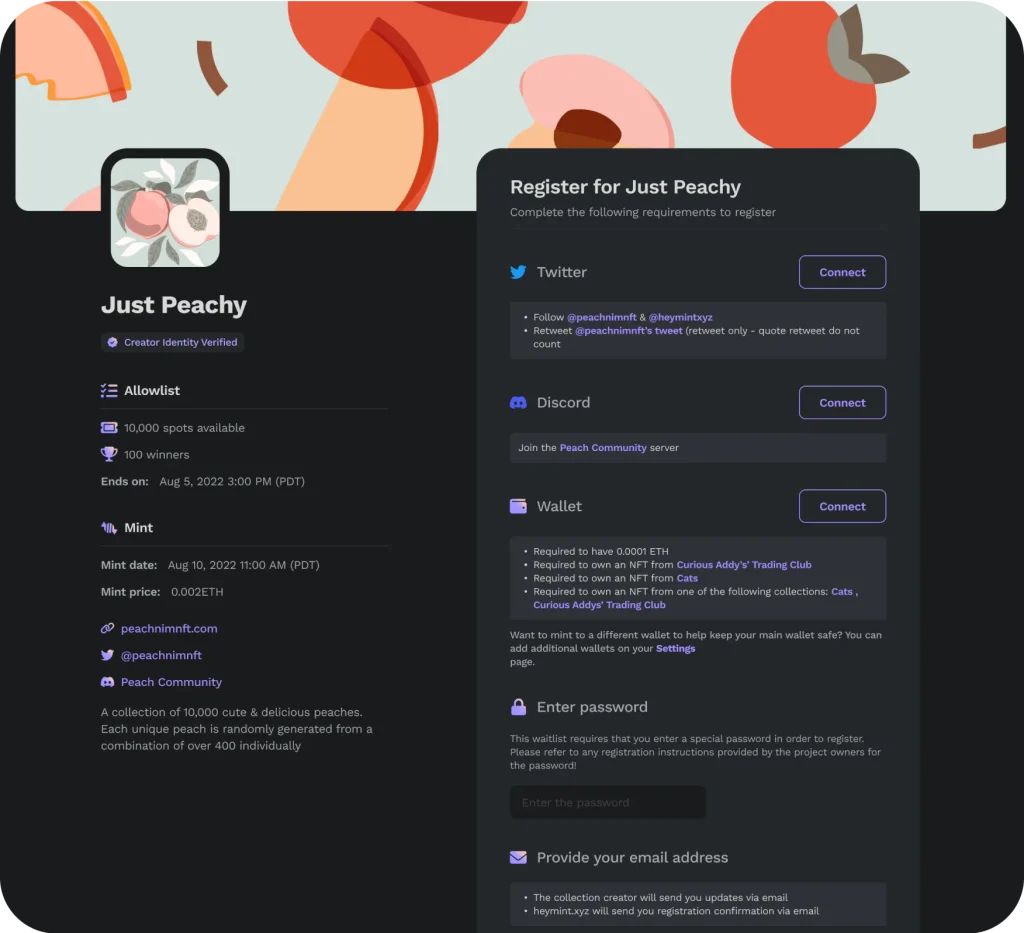
Alpha: any information, advice, strategy, or insider knowledge meant to give you a competitive edge in the market, or which could be leveraged for financial gain. It is also informally used to talk about the sharing of new information unknown to others.
Ape In: to buy-in to a project (generally crypto or NFT related) without doing any research beforehand.
Blockchain: the accumulated total of a sequence of blocks (data containing varying and specific bits of information regarding transactions at a given point in time) stored on a public ledger. This is the basis for all major cryptocurrencies (Ethereum, Bitcoin, etc.)
Blue Chip: projects which are trusted, well known in the public eye, and have generally achieved a great deal of stability and consistent financial success. Crypto Punks was objectively the first blue chip NFT project, but today, many others exist: World of Women, BAYC, etc.
Cold Wallet: a hardware connected device which secures the wallet by requiring a manual button press before transactions can be processed. Cold wallets are not connected to the internet by default. This combination ensures a much higher level of security, as a scammer would generally require access to both the account and the device in order to move/transfer any funds/tokens. Please remember that a lost or destroyed cold wallet’s assets may still be recovered (or stolen), so long as the user knows their seed phrase.
If you are in the market for a cold wallet, we’d be thankful if you used one of our affiliate links below. By purchasing, not only will you help protect your assets; you’ll also be supporting our platform and funding additional helpful resources such as this. Ledger and Trezor are the two most popular wallet manufacturers at the moment, although Keystone has also been growing in popularity.
Ledger: (Main Shop Page / Ledger Nano S Plus / Ledger Nano X / Ledger Stax)
Trezor: (Main Shop Page / Model T / Model One)
Keystone: (Main Shop Page)
Crypto: short for “cryptocurrency”; any form of digital currency on a blockchain, and protected by cryptography. Unlike fiat currency, cryptocurrency is nearly impossible to forge or counterfeit.
DAPP/dApp/dapp (Decentralized Application): any application which uses blockchain technology or cryptocurrency, operating similar to a peer-to-peer network, rather than through an individual computer. Their decentralized structure removes them from control by any single point of authority. Some notable dapps include CryptoKitties, Axie Infinity, and Decentraland.
DYOR (Do Your Own Research): a shorthand advising people to think carefully and do their due diligence before investing into a project. Some aspects of DYOR may include: researching the team, examining their roadmap and past projects, seeing whether or not they are doxed, and many other factors which may influence the viability of their project or its ability to succeed.
Decentralization: delegating operational control of a group or organization to a network of localized bodies, as opposed to a singular, centralized body. Blockchains (Ethereum, Bitcoin, etc.) are decentralized by design.
Discord: one of the two most popular messaging platforms for the NFT and crypto communities (the other one being Twitter).
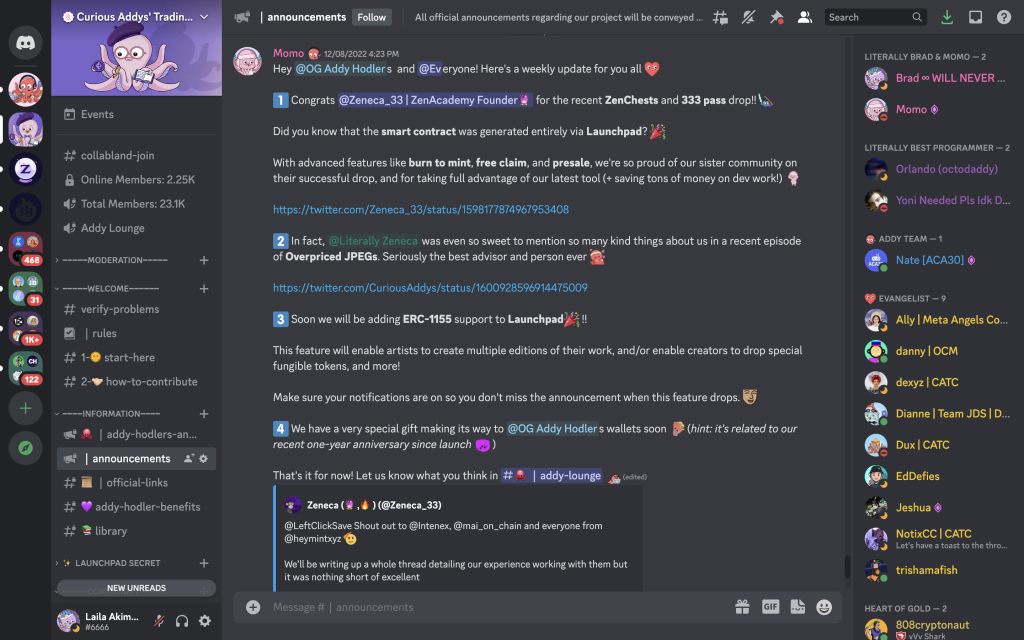
Ethereum: A decentralized, open-source blockchain with smart contract functionality, founded in 2013 by Vitalik Buterin. A wide variety of applications and other tokens have been built upon the Ethereum blockchain. NFTs on the Ethereum blockchain currently overshadow all others in terms of visibility and total sales.
Flip: the process of buying an NFT and reselling it for profit.
Flipper: someone who actively and regularly engages in flipping.
Fungible: a non-unique asset which is interchangeable for another: a dollar bill, 1 ETH, etc.
FOMO (Fear Of Missing Out): a mix of greed, jealousy, fear, and anxiety which compels many people to act irrationally and make poor decisions.
Gm: short for “good morning”, the standard greeting/hello in the NFT & crypto community. A deeper meaning has also developed, in that we use gm regardless of timezone or time of day. This is because anybody in the space right now is seen as being early, thus it’s always a “good morning”.
HODL: as legend goes, this term comes from a Bitcointalk forum post from back in 2013, in which the user mispelled “HOLD” as “HODL”. The term achieved meme status and is now also synonymous with the phrase “Hold on for Dear Life”. To HODL is to hold tight to your assets, refusing to sell, regardless of what the market is doing.
Hot Wallet: Hot wallets are popular, internet connected software wallets. Their convenience and lack of cost have made them ubiquitous in the space. Due to their connection to the internet, hot wallets are inherently less secure and more susceptible to being compromised than cold wallets. Please remember that a lost or destroyed hot wallet may still be recovered (or stolen), so long as the user knows their seed phrase. MetaMask and Trust Wallet are two popular examples of hot wallets.
Launchpad: our complete no-code toolbox with everything you need to launch your NFT project. No technical experience or programming knowledge required. From art generation and custom smart contracts, to allowlists, metadata, and custom mint button embeds, Launchpad has you covered.
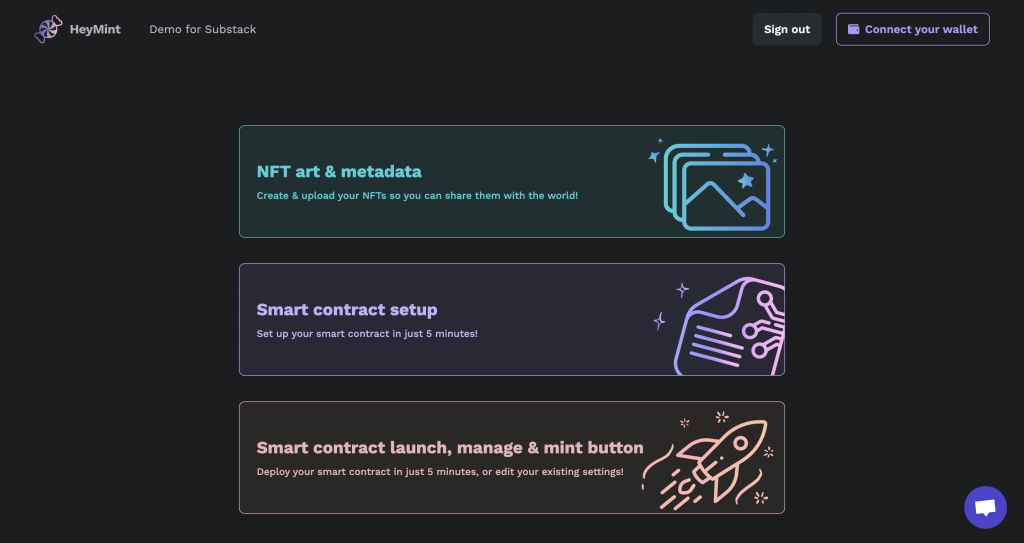
LFG (Let’s Fucking Go): basically, “Let’s do this!”, but with more swearing.
Mint: to buy an NFT directly from the smart contract (as opposed to secondary sales on a marketplace such as OpenSea).
MM (MetaMask): The best known hot wallet for the Ethereum cryptocurrency. It also supports popular Layer 2 solutions such as Polygon, Optimism, and Arbitrum.
NFT (Non-Fungible Token): a digital asset and certification of uniqueness stored on the blockchain as a piece of data which is not interchangeable or replicable. NFTs come in many forms, but are commonly associated with images, video, or audio.
Non-Fungible: a unique asset which is not interchangeable for another: the Mona Lisa, your dog, your mom’s cooking, etc.
Off-chain: not entirely self-contained on the blockchain, with at least some some connection to a centralized server, cloud service, or a peer-to-peer network (such as the InterPlanetary File System). Off-chain collections do not include all necessary images and metadata on the blockchain; instead, they favor offloading images and metadata.
On-chain: entirely self-contained on the blockchain, with no connection to a centralized server, cloud service, or peer-to-peer network (such as the InterPlanetary File System). On-chain collections include all necessary images and metadata on the blockchain.
OpenSea: The largest and most popular NFT marketplace.
PFP (Profile Picture): A digital avatar/representation of yourself. PFPs in the space are often (but not always) taken from NFTs that the user is a part of or supports in some manner.
Rug Pull: a scam where the developers of a project deliberately abandon it immediately or shortly after making their money from the mint/launch.
Seed Phrase: a 12-24 word master password made up of a series of randomly assigned words that grants access to your wallet. It is also used in the recovery of your wallet in the event of a lost/damaged device.
Wallet: in the world of cryptocurrency, a wallet is either a physical device, program, or service which stores public and private keys, and enables signings and general transactions. Wallets generally come in two major varieties: hot (internet connected, such as MetaMask, Coinbase, Trust, etc.) or cold (a physical device not connected to the internet, such as a Ledger Nano X or a Trezor One).
Whale: someone with a lot of money to invest in crypto/NFTs who isn’t afraid to spend it. Whales drive a lot of interest in projects, and the attention from a whale is sometimes all it takes to initiate a flurry of sales, as other members of the crypto/NFT community follow their lead.
75+ Additional Definitions
Now that you have a good grasp of essential NFT Terminology, it’s time to get into the thick of it! You’ve already learned enough to stand on your own, but here’s a new list of common words (including more crypto and web3 definitions as well) to deepen your conversations in the space.
ATH (All Time High): The highest price that has ever been achieved at any point in a project/token’s history.
Anon: abbreviated form of “anonymous”, denoting an unknown individual; some rando on the internet.
Artdrop: a more specific term for an airdrop containing a piece of art. Some communities (such as Curious Addys or World of Women) have been known to reward their NFT holders with periodic artdrops.
Avatar: a digital representation of yourself or your persona.
BTFD (Buy the Fucking Dip): A mantra advising one to make purchases during a price decline (such as when the price of crypto falls), allowing an individual to capitalize on the volatility of the market.
Bag(s): the collective assets one owns; a tidy sum of money.
Bearish: to not support, be in favor of, or believe in something (usually in reference to an NFT project or a cryptocurrency).
Bear Market: when the NFT/Crypto space experiences a steep price decline, and is hesitant to spend money. As a result, crypto prices may fall dramatically over a prolonged-period of time.
Bitcoin: abbreviated BTC, it was the first cryptocurrency. Created in 2008 by the pseudonymous creator, Satoshi Nakamoto, Bitcoin allows for users to send funds over the blockchain — a digital public ledger.
Block: a piece of data containing varying and specific bits of information on transactions at a given point in time. These blocks are what make up the blockchain.
Block/Blockchain Explorer: a site which gives the ability to view transactions of any given address on the blockchain. Examples include Etherscan (for Ethereum) and Polygonscan (for Polygon).
Blur: an NFT marketplace for pro traders.
Bridge: the means by which you convert your tokens from one blockchain to another. One of the most common forms of bridging can be seen on OpenSea, where people may convert Ethereum to Polygon. As many different marketplaces, apps, and wallets have been built to interact with a variety of differing assets, bridging is occasionally required before you may spend your assets.
Bullish: to strongly support, be in favor of, or believe in something (usually in reference to an NFT project or a cryptocurrency).
Bull Market: when the NFT/Crypto space experiences a steep price increase, and is optimistic in spending money. As a result, crypto prices may rise dramatically, over a prolonged-period of time.
Burn/Burning: permanently removing a token from circulation by sending it to an unretrievable address that nobody can access. Burning happens for a number of reasons, including: removing problematic or unwanted inventory, eliminating unsold stock, decreasing supply (thus increasing scarcity and the value of the remaining tokens), or being used as a gaming mechanic.
Burner Wallet: a secondary wallet, separate from your main account, primarily used for minting, signing permissions, connecting to unfamiliar sites, or any other interactions you’d rather shield your main account from.
Coinbase NFT: an NFT marketplace developed by the cryptocurrency exchange platform Coinbase, launched on April 20th, 2022.
DAO (Decentralized Autonomous Organization): an organization managed on the blockchain; members who participate in a DAO have partial ownership of the organization (usually represented by some sort of governance token), thereby granting them the ability to participate (usually by vote) in decision making for the direction of the organization.
DeFi (Decentralized Finance): finances which are not beholden to a central authority such as banks, or a federal reserve. Online, DeFi generally refers to cryptocurrencies/blockchain technologies where users can manage their own assets.
Degen: a “degenerate”. Despite normally being used as a pejorative (“degenerate gambler”, etc),this is a title that many people in the space proudly claim.
Diamond Hands: somebody who holds onto their assets through thick or thin, regardless of market conditions.
Doxed: to make one’s identity known to the public. Although not a guarantee of success or a team’s ability, doxed projects are generally well regarded in the space, due to operating transparently out in the open. Doxed projects may also carry a lower risk of being scammed or falling prey to a rug-pull, as they leave you with a point of contact, should issues arise.
Ether: the token of the Ethereum blockchain. As the native cryptocurrency of the platform, it is what is bought and sold on the market. In terms of market cap, Ether is second, after Bitcoin.
Fiat: our traditional understanding of currency, wherein a central bank helps regulate its backing and distribution, and which the government generally declares to be legal tender. Examples include the US dollar, Yen, and Euro.
Floor Price/”The Floor”: the lowest price in an NFT collection that is currently listed on the market and available for purchase.
Fren: cute internet slang for “friend”.
Fud/FUD (Fear, Uncertainty, and Doubt): an intentional strategy to cast doubt on a project by negatively shifting public perception to one that is fearful and questioning.This is often combined with information that has been taken out of context or is misconstrued, and/or the dissemination of dubious or spurious claims.
Gas: the fee required to process a transaction on the blockchain. Consider gas fees a digital fuel surcharge. Gas is required for everything from buying and selling NFTs, sending crypto, deploying smart contracts, swapping tokens, and more. Fees vary wildly depending on the complexity of the transaction, the blockchain used, and market fluctuations at the time of the transaction. Gas is typically measured in GWEI. Want to know how to save gas for all of your transactions? Check out this article.
Gas War: seen in collections with a lot of anticipation and public demand. If there are two transactions that occur at the same time, with all things being equal, the transaction with the higher gas fee will be entered into the blockchain first. Because of this, some people artificially inflate their gas fees in order to ensure that their transaction is prioritized before everyone else’s. This can reach ludicrous extents with some of the biggest projects, resulting in massive, costly spikes.
Gmaen: an amalgamation of “good morning, afternoon, evening, night”. Created by Crypto Coven to be inclusive of everyone, regardless of timezone. It also sounds vaguely witchy, which is on brand for them.
Gn: short for “good night”, a common sign off used by those in the NFT/crypto community.
Gwei: a very small unit of Ether cryptocurrency: one gwei is equal to 0.000000001 ETH (it takes 1 billion gwei to make 1 ETH). Gwei is most commonly used when talking about gas fees.
HeyMint: our allowlist manager, 100% free because we 💜 you. Create and launch an allowlist in just 5 minutes. Full of robust customization requirements to ensure that the right collectors join your list. And for collectors, we offer an explore page where projects are launching with us every single day, as well as a collector’s dashboard to keep track of your submissions.
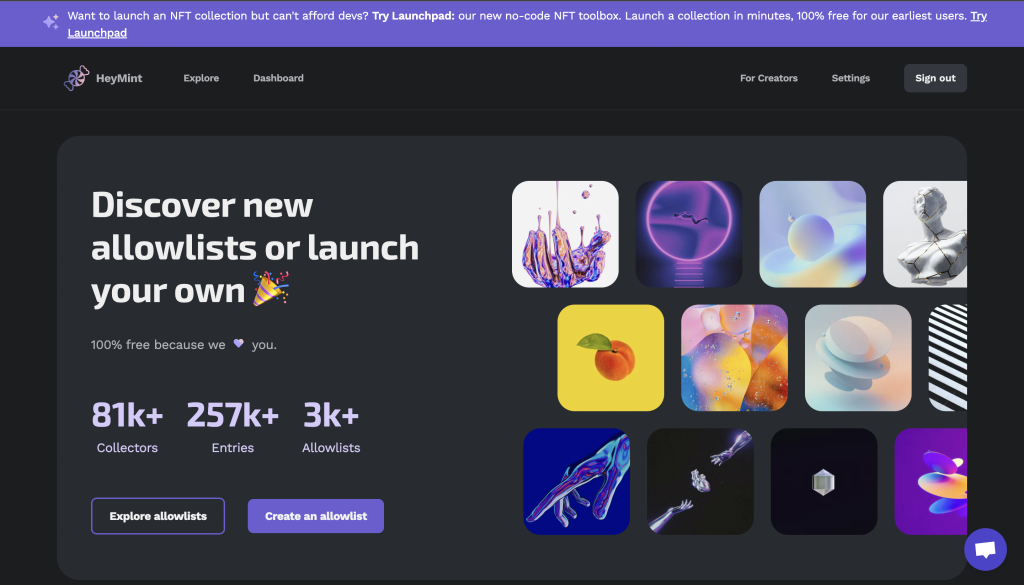
Irl: short for “in real life”, irl is the perceived opposite of the metaverse, connected only to the tangible, physical world.
JPEGs: affectionately and jokingly reclaimed by the community to collectively refer to all NFTs, even if not in .jpg format (such as PNGs, or even non image files that are audio or video).
Lambo: short for Lamborghini. A common joke in the crypto/NFT community is “Wen Lambo?”, which effectively means, “When will this project do well enough that I can sell it and buy myself a Lamborghini?”.
Liquid: if referring to a person, having an abundance of assets/funds on hand (especially fiat or ETH); if referring to a collection/project on the market, one defined by high trading volume activity and many participants.
”Looks Rare”: a semi-sarcastic NFT meme, used disingenuously to describe something not rare at all; alternatively, used jokingly and affectionately to describe irl things, such as someone’s partner/pet/child. Rarity traits are one of the major driving factors of an NFT’s value, hence the meme.
LooksRare/LR: a competing NFT marketplace to OpenSea, launched in January 2022.
Magic Eden: the leading NFT marketplace for the Solana blockchain.
Memecoin: cryptocurrencies based on a meme (such as Dogecoin, Shiba Inu, MonaCoin, etc.)
Metaverse: objectively still in its infancy, the metaverse is an umbrella term for our digital parallel to the physical world; a virtual web3 space built upon social connections, advanced technology, and breaking boundaries. When labelled as “a metaverse”, people are usually referring to a specific virtual/digital community, such as Second Life, Decentraland, The Sandbox, etc. When labelled as “the metaverse”, they generally mean an all encompassing digital future including but not limited to: the internet, gaming, AR, VR/XR, AI, and decentralized technologies.
Miner: one who engages in mining.
Mining: the computational work that nodes in a Proof-of-Work network (such as Bitcoin) employ in adding transactions to the blockchain.
Mintlist: A list of people who have been granted access to mint/buy a project before it goes to public sale. Alternate terms include presale list and allow list.
Moon: used as a verb, it refers to a token/cryptocurrency/NFT drastically increasing in financial value, usually in a short span of time.
NFA (Not Financial Advice): a disclaimer one uses to let their audience know that what they are sharing is merely opinion, and should not be taken as financial/investment advice. You will often see this prefacing someone talking about a project that they think is about to take off.
NGMI (Not Gonna Make It): The opposite of WAGMI (We’re All Gonna Make It), ngmi is used to derogatorily or jokingly suggest that based on an individual’s actions, they are not likely to succeed in the space.
OG (Original Gangster): a person or collection that has been in the space for a significant amount of time; a veteran in the space.
Paper Hands: Someone who is quick to sell. Reasons for paper handing include: wanting to flip the token(s) for a quick profit, selling due to a real or perceived loss in value, or even for non-financial reasons such as losing faith in the project or team. This term is occasionally used as a pejorative.
Polygon: a Layer-2 Ethereum protocol which gained popularity for its significantly cheaper transactions. As one of the default payment option types on OpenSea, it has remained a viable alternative for many who wish to ensure low mint costs and negligibly small gas fees, as well as for buyers who don’t want to spend a lot on transactions.
Presale list: A list of people who have been granted access to mint/buy a project before it goes to public sale. Alternate terms include allow list, mintlist, and whitelist.
”Probably Nothing”: a meme steeped in sarcasm, suggesting the exact opposite – that this is important and people should probably pay close attention.
Pump: the act of purchasing large quantities of an asset in the hopes of driving the price of the asset up.
REKT: an intentional misspelling of “wrecked”, which denotes something that is completely destroyed, ruined, or otherwise beyond repair.
Right-Click Save: used primarily by people outside of the space to mock those inside of it, right-click saving is the act of saving a photo of an NFT, often with the clever follow-up, “Thanks, it’s mine now!”, or “I have the same one!”. The implication is that NFTs are inherently valueless because anyone can save a digital copy of the photo (not understanding that the value is tied to the blockchain itself).
Right-Clicker: someone who engages in “right-click save” trolling practices; an NFT naysayer who does not understand or believe in the value of NFTs.
Rugged: to have been caught in a rug pull.
Secondary: also known as the secondary market, or secondary sales, this refers to all forms of NFT resale transactions. The most common secondary marketplace for NFTs (the bulk of which are on Ethereum) is OpenSea.
Sell Shame/Sell Shaming: to criticize someone for making a profit by selling their asset(s)rather than holding onto them.
Ser: intentional misspelling of “sir”; often used jokingly before presenting a contrarian view. Due to its assuming of gender, the term is viewed as not inclusive by some in the space.
Shill: to shamelessly promote a project, product, or service (typically your own, or one you are invested in).
Smart contract: a code-based agreement that executes automatically when certain conditions are met. Smart contracts are irreversible, cannot be changed, and remain permanently on the blockchain. The trustless nature of smart contracts are why they are such a powerful tool in shaping an open and transparent web3 ecosystem.
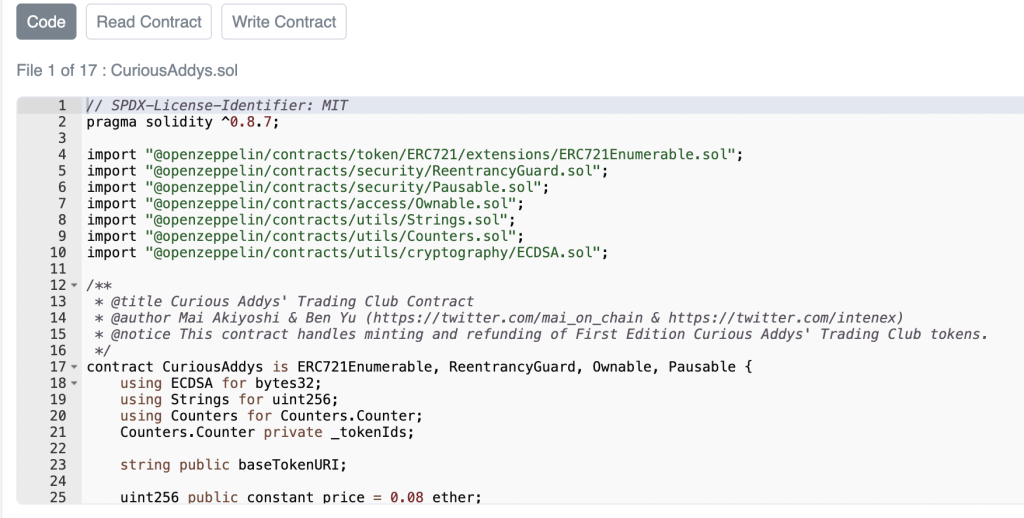
Soft rug pull: a lengthier, less apparent rug pull. In a soft rug pull, the messaging/involvement of the project founder(s) falls to the bare minimum as progress is intentionally stalled or stopped. There are two major reasons someone may choose to soft rug pull. First, it gives (limited) deniability of any wrongdoing on behalf of the staff. Second, the lack of communication is done in hopes that holders will begin to leave or stop asking questions.
Solidity: the industry standard programming language for developing smart contracts on various blockchains—most notably, Ethereum.
Stablecoin: a form of cryptocurrency that, in theory, offers price stability and is generally backed by a reserve asset, commodity, fiat, or algorithm (USDC, DAI, USDT, etc.).
Stake/Staking: the process of locking down tokens for a period of time, which benefits a network’s security and stability. When tokens are staked, they cannot be used, and the user who staked them receives a bonus or some form of reward in return.
Sus: short for “suspicious” or “suspect”. A derogatory way of describing something which seems like a red-flag, a scam, or too good to be true.
Sweeping the Floor: to buy a significant amount of floor-price NFTs. This practice is welcomed and usually done to either drive up the floor price of the collection, or simply because the buyer passionately believes in the project.
Thin Floor: when few tokens are listed at the floor price. This effectively means that it takes very few sales in order to pump (increase) the floor price of a collection.
Token: any crypto asset, generally built upon a blockchain. Tokens have a wide array of utility and purpose, including NFTs, digital currency, governance, DeFi, security, and more.
TradFi (Traditional Finance): finances which are beholden to a central authority such as banks, or a federal reserve; finances as most people understand them: stocks, bonds, etc.
Trustless: without need of trust in a third party in order to operate. This generally refers to smart contracts (which may operate automatically), or crypto transactions (which lack intermediaries such as banks or governments).
Undoxed: to remain anonymous and keep one’s identity unknown to the public. Undoxed projects inherently carry with them a higher risk of being scammed or falling prey to a rug-pull, as there is no point of contact should issues arise. One minor caveat, however, is that there are several very successful and notable projects with teams that are undoxed.
WAGMI (We’re All Gonna Make It): The rallying cry of the crypto and NFT communities, it demonstrates a love for the space, is used to show camaraderie among friends, and presents an optimistic belief that the future can be prosperous for everyone.
Wen: an intentional misspelling of “when”. Usually paired with inane conversations about money: “wen moon?”, “wen lambo?”, “wen 10x?”, etc.
X2Y2: another large NFT marketplace that caters to the Ethereum blockchain.
40+ Advanced Definitions
At this point you can hold your own, and have already learned NFT Terminology for over 100 different words! But if you really want to soak in as much as you possibly can, we’ve got you covered! Here are 40+ advanced definitions to help you master the space. While some of the following words you may be familiar with, others may be technical, obscure, or not as well known by beginners.
BUIDL: intentional typo of “build”, likely meant to reflect HODL (which itself originated as a typo for “hold”). This has become common advice to build things of substance and use, even/especially when the market is suffering. The call to BUIDL is meant to encourage everyone to actively contribute to their blockchain ecosystem, and further development of the space.
CC0 (Creative Commons 0): also known as “No Rights Reserved”, it effectively relinquishes one’s held rights, waiving them in favor of benefiting the public domain. Anyone is free to use CC0 works however they wish, even for commercial purposes.
DA (Dutch Auction): a method of selling wherein the price starts at the ceiling, and begins to lower in gradual increments until a natural price point is found, and the market buys in.
DCA (Dollar Cost Averaging): an investment strategy proven to minimize volatility and optimally capture long term gains. Instead of trying to time the market, DCA makes purchases at regular periodic intervals, regardless of the current price, which over time averages out all of the short term price fluctuations to ensure that one captures a truer price of the market. Interested in testing it out? Our founders, Mai Akiyoshi and Ben Yu made a tool called Crypto Auto Investor which simplifies and automates the process.
Derivative: a project which is an obvious derivation of another. Some derivations are not supported by the original community (such as CryptoPhunks), and other derivations are welcomed or even planned by the original community(such as Mutant Apes).
ERC (Ethereum Request for Comment)
| ERC Type | Description | Fungible/Non-Fungible |
|---|---|---|
| ERC-20 | The most common standard for creating fungible cryptocurrencies on top of the Ethereum blockchain. Examples include: USDC, APE, SHIB. Created in 2015, and released in 2017. | Fungible |
| ERC-721 | The most common standard for creating non-fungible tokens (NFTs) on top of the Ethereum blockchain. Released in January, 2018. | Non-Fungible |
| ERC721A | A modification of ERC-721 made by the team behind Azuki. Notable for its ability to mint multiple NFTs in a single transaction with significantly reduced gas fees. Released in January, 2022. | Non-Fungible |
| ERC-1155 | A hybrid NFT standard which allows for fungible or non-fungible tokens, and batch transfer of tokens. Commonly used in NFTs and blockchain games. Created in June 2018, and released in June 2019. | Fungible, Non-Fungible, or “Semi-Fungible” |
(The) Floor is Lava: a rapidly rising floor price, like quick rising lava. In other words, the result of many sales in a short span of time.
Flying: a quick and dramatic rise in the price of a project/NFT collection.
Fork: a significant split in the direction of a blockchain network, resulting in a new protocol and code. Forks are often the result of a significant difference in opinion over the direction of a network.
”Free Nitro”: a perennial favorite among Discord scammers. These scammers will head into servers and post links which promise free upgrades to Discord’s premium Nitro features. The links, if clicked, are almost always malicious either in their code, or in redirecting the victim to external sites meant to scam the user.
Fxhash: a popular NFT marketplace for creating and collecting generative art on the Tezos blockchain.
Generative Art: algorithmically determined, computer generated artwork. Generative Masks and Art Blocks are two notable projects in the field.
Hosted Wallet Service: any wallet or service which holds or manages your private keys for you, such as Coinbase. This is the opposite of a self-custodial/non-custodial wallet.
ICO (Initial Coin Offering): the crypto equivalent of an IPO (initial public offering). ICOs are generally used as fundraising measures by a company in the development of new apps, products, or services.
IPFS (InterPlanetary File System): a P2P (peer-to-peer), decentralized storage and file referencing system used for the storage and accessing of data files.
Illiquid: if referring to a person, the lack of assets/funds on hand (especially fiat or ETH). If referring to a collection/project on the market, one defined by low trading volume activity and few participants.
Immutable: can’t be deleted, modified, or changed in any way after its initial creation. Blockchains are immutable by design; a core reason for their appeal.
Kevin: a meme derived from the Pixelmon NFT collection, an infamous example of over-promising and under-delivering in the space. After raising over $70 million (USD), the reveal of the NFT collection was found to be, shall we say, lacking? One such unimpressive reveal dubbed “Kevin” (after his species name), was made into a meme almost instantly. Kevin has gone on to receive the lion’s share of Pixelmon’s scrutiny and attention. Kevin’s likeness has appeared in many derivative and joke projects, as well as becoming the subject of fan art from around the world.
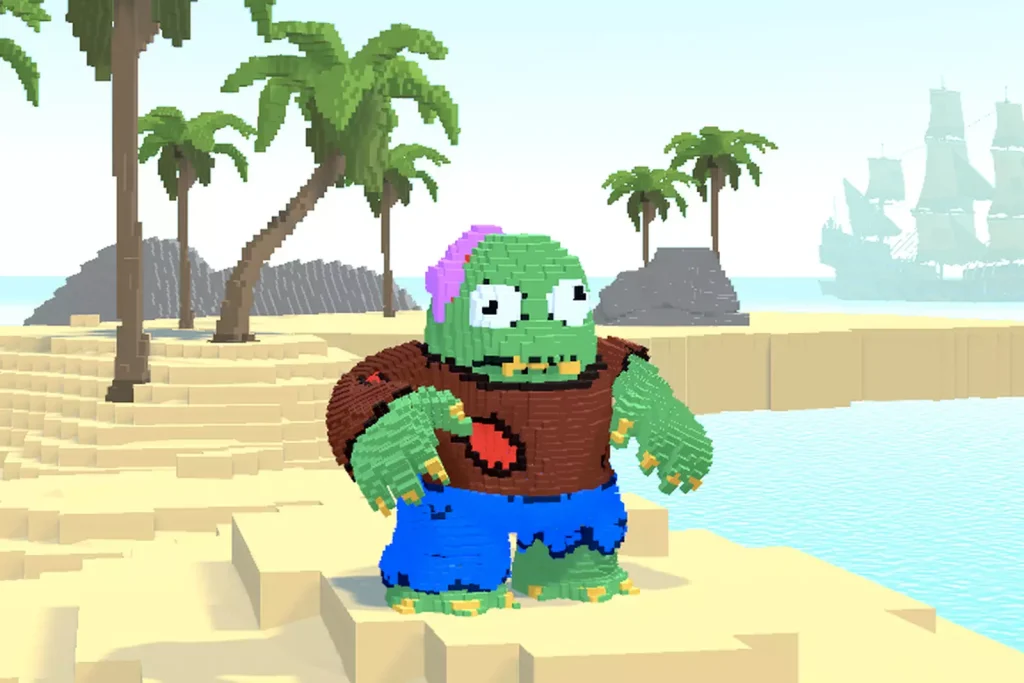
L2 (Layer 2): a secondary framework built atop an already existing blockchain. The main purpose of L2s are to solve limitations of the blockchain they are built upon, such as problems of scale, transaction speeds, security, gas, etc. For example, one of the most recognizable L2 solutions of Ethereum is Polygon.
LL (Larva Labs): created by Matt Hall and John Watkinson, a pair of Canadian software developers with a history of app development for Android and iOS, and originators of the historical NFT collection, CryptoPunks, as well as Meebits, and Autoglyphs.
Maxi (Maximalist): terminology derived from politics for someone who holds strong views and is unwilling to compromise. In the crypto space, a maxi is someone who strongly believes in the viability and future dominance of a particular crypto (Ethereum, Bitcoin, etc.) above all others.
Nesting: what the Moonbirds collection calls staking.
Nitro: a paid membership for Discord which grants (primarily cosmetic) perks for the user, along with some beneficial server enhancements.
Node: any computer that connects to a blockchain network. Together, nodes support the network by processing transactions and validating requests.
Nonce: a sequential running number of all the transactions ever executed by a given address (beginning with 0 for the first transaction). In layman’s terms, a nonce is your ticket order, with a lower number nonce being processed before the next transaction (ie, a tx with a nonce of 14 would process before a tx with a nonce of 15). The word “nonce” comes from cryptography, and is an amalgamation of the words “number” and “once”: in other words, a number you can only use once.
Normies: people who do not participate or believe in crypto, NFTs, or web3.
Objkt: the largest NFT marketplace on the Tezos blockchain.
P2E (Play to Earn): a model which enables players to receive payments for their actions in the game. Crypto games have traditionally followed the P2E model.
POAP (Proof of Attendance Protocol): NFT collectibles on xDai (an inexpensive network with fast transactions). It is generally given out at events, conferences, and online activities, and made to signify that the user attended a particular event. As OpenSea does not support xDai, most people download the POAP app from their website in order to track all of the POAPs they have collected.
Pump and dump: a fraudulent form of market manipulation carried over from the stock market. A group of investors are deceived into buying shares of a company (often under false promises of significant gains). This act drives the price up artificially, until it reaches a point where the fraudsters exit the space by selling all of their shares while the price is high, and making a tidy profit at the expense of said investors. The scheme effectively operates the same in the crypto space.
Pumping: when an asset (typically an NFT or crypto) is rapidly and steadily climbing in price.
Raid: when a number of people make a united effort to promote a project or cause. This is usually done on an influencer or celebrity’s tweet in order to maximize their visibility and draw attention to their own project or cause. This is accomplished by numerous individuals making similar comments, or by everyone mass-liking the original post. Some raids go the other direction, however, and may be malicious or done for the purpose of trolling—typically on Discord.
ReFi (Regenerative Finance): to take the fundamental concepts of DeFi and consciously apply them in such a way that directs capital to communities, projects, charities, or marginalized groups in need.
SBT (Soulbound Token): an NFT that is unable to be transferred, bought, or sold. They were proposed by Vitalik Buterin (founder of Ethereum) in his blog post from January 26th, 2022, and detailed in a paper entitled Decentralized Society: Finding Web3’s Soul on May 11th, 2022. SBTs have many potential uses that remain to be explored, but they are already theorized as a means of establishing a web3 identity. This may include elements such as: work history, medical records, or certificates of accomplishment, and other education-based credentials. Curious Addys launched an early example of SBTs when, in June 2022, they launched Curious Credentials, a soulbound token which could be earned on their web3 Q&A site, Curious.xyz. The SBT serves as proof of their reputation and contributions to the platform, and dynamically updates in real time.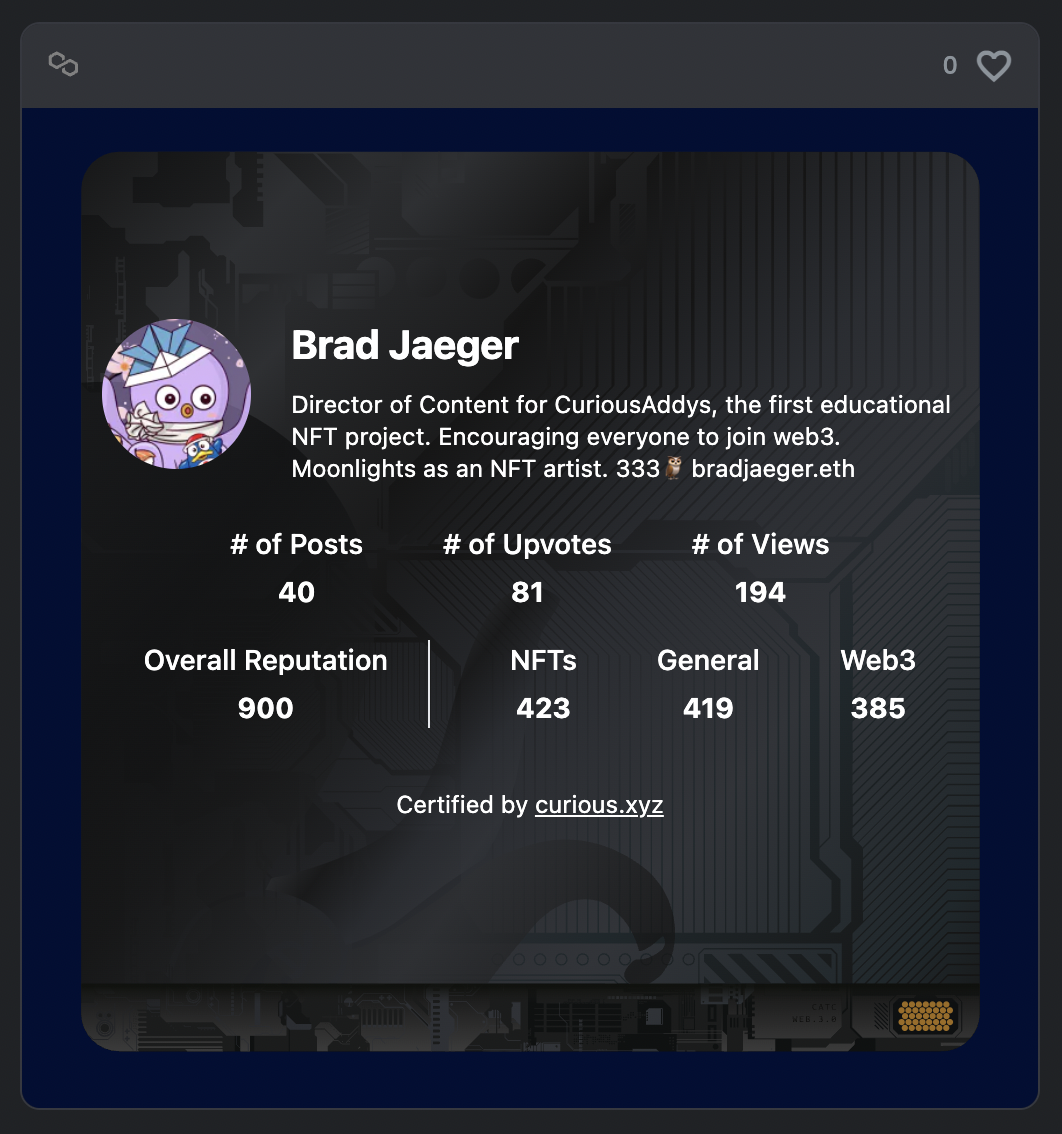
Self Custody / Non-Custodial: Possession of your private key and therefore, all of your digital assets. MetaMask is a self-custodial/non-custodial wallet; keeping your assets on Coinbase is not. Non-custodial wallets mean that the users are in full control (and responsible for) their own assets because they hold the private key; in a custodial situation, a third party such as Coinbase or another exchange holds your assets and your private key.
Social token: any cryptocurrency that a community or brand uses to leverage & monetize themselves.
WL (Whitelist): A list of people who have been granted access to mint/buy a project before it goes to public sale. Recently this term has fallen out of favor with some in the space. Alternatives which have surfaced include: allowlist, presale list, and mintlist.
Web1: the earliest iteration of the internet, now defined by its inability to interact beyond the most basic forms of communication, such as email. Users were passive consumers, websites were largely static and informational, and most things online were read-only. Content creation (beyond the most rudimentary form of personal websites) were virtually nonexistent.
Web2: the current iteration of the internet, which we are in the process of transitioning out of. At the forefront of the web2 era is an emphasis on social media and interconnectedness, enabling new means of global connections. Advancements in internet technology mean that high definition images, audio, and video could be shared or streamed for the first time. Content creation becomes common, as people begin actively putting their own information out into the world rather than merely consuming it. Few seem to reap the rewards, outside of major companies which facilitated or hosted the content.
Web3: the future iteration of the internet, which we are in the process of transitioning to. The two key ideals which have sparked this new web3 era are decentralization and ownership, both of which are fueled by permissionless and trustless smart contracts executed on the blockchain. Distinctions between the physical world and the digital world begin to become less defined, as the web3 era seeks to integrate itself and its new technologies into the greater overarching concept of the metaverse.
Whitepaper: an extensive piece written by the team, documenting their work in detail so as to educate the public about their project. The term “whitepaper” comes from when government papers were once color-coded, with white papers being documents that were marked for public access.
Final Thoughts About NFT Terminology
And there you have it! A comprehensive list of the most common NFT terminology in the space, along with a healthy dose of crypto and web3 as well! This list is a passion project, with new definitions being added periodically. We hope that you’ve enjoyed this article.
Don’t forget to check out our HeyMint Blog for more useful information and to share this article with anyone who may find it helpful. Are there any words for our NFT Terminology list that you think we should include? Let us know!
Further Reading

How to Start an NFT Collection
The Ultimate Guide to Digital Collectibles
NFTs for Dummies
How Much Does It Cost to Make an NFT?
How to Create an ERC-721A NFT Collection With Launchpad
